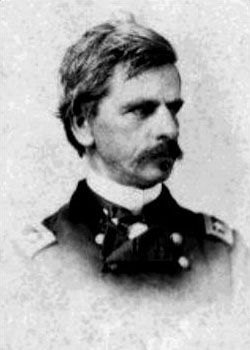| Nathaniel P. Banks  AKA Nathaniel Prentiss Banks AKA Nathaniel Prentiss Banks
Born: 30-Jan-1816
Birthplace: Waltham, MA
Died: 1-Sep-1894
Location of death: Waltham, MA
Cause of death: unspecified
Remains: Buried, Grove Hill Cemetery, Waltham, MA
Gender: Male
Race or Ethnicity: White
Sexual orientation: Straight
Occupation: Politician, Military
Party Affiliation: Republican [1] Nationality: United States
Executive summary: House Speaker, Governor of Massachusetts Military service: Union Army (Maj. General of Volunteers, 1861-65) American politician and soldier, born at Waltham, Massachusetts, on the 30th of January 1816. He received only a common school education and at an early age began work as a bobbin-boy in a cotton factory of which his father was superintendent. Subsequently he edited a weekly paper at Waltham, studied law and was admitted to the bar, his energy and his ability as a public speaker soon winning him distinction. He served as a Free Soiler in the Massachusetts house of representatives from 1849 to 1853, and was speaker in 1851 and 1852; he was president of the state Constitutional Convention of 1853, and in the same year was elected to the national House of Representatives as a coalition candidate of Democrats and Free Soilers. Although re-elected in 1854 as an American or "Know-Nothing", he soon left this party, and in 1855 presided over a Republican convention in Massachusetts. At the opening of the Thirty-Fourth Congress the anti-Nebraska men gradually united in supporting Banks for speaker, and after one of the bitterest and most protracted speakership contests in the history of Congress, lasting from the 3rd of December 1855 to the 2nd of February 1856, he was chosen on the 133rd ballot. This has been called the first national victory of the Republican party. Re-elected in 1856 as a Republican, he resigned his seat in December 1857, and was governor of Massachusetts from 1858 to 1861, a period marked by notable administrative and educational reforms. He then succeeded George B. McClellan as president of the Illinois Central railway. Although while governor he had been a strong advocate of peace, he was one of the earliest to offer his services to President Abraham Lincoln, who appointed him in 1861 major-general of volunteers. Banks was one of the most prominent of the volunteer officers. When McClellan entered upon his Peninsular Campaign in 1862 the important duty of defending Washington DC from the army of Stonewall Jackson fell to the corps commanded by Banks. In the spring Banks was ordered to move against Jackson in the Shenandoah Valley, but the latter with superior forces defeated him at Winchester, Virginia, on the 25th of May, and forced him back to the Potomac river. On the 9th of August Banks again encountered Jackson at Cedar Mountain, and, though greatly outnumbered, succeeded in holding his ground after a very sanguinary battle. He was later placed in command of the garrison at Washington, and in November sailed from New York with a strong force to replace General B. F. Butler at New Orleans as commander of the Department of the Gulf. Being ordered to cooperate with Ulysses S. Grant, who was then before Vicksburg, he invested the defenses of Port Hudson, Louisiana, in May 1863, and after three attempts to carry the works by storm he began a regular siege. The garrison surrendered to Banks on the 9th of July, on receiving word that Vicksburg had fallen. In the autumn of 1863 Banks organized a number of expeditions to Texas, chiefly for the purpose of preventing the French in Mexico from aiding the Confederates, and secured possession of the region near the mouths of the Nueces and the Rio Grande. But his Red River expedition, March-May 1864, forced upon him by superior authority, was a complete failure. In August 1865 he was mustered out of the service, and from 1865 to 1873 he was again a representative in Congress, serving as chairman of the committee on foreign affairs. A personal quarrel with President Grant led in 1872, however, to his joining the Liberal-Republican revolt in support of Horace Greeley, and as the Liberal-Republican and Democratic candidate he was defeated for re-election. In 1874 he was successful as a Democratic candidate, serving one term (1875-77). Having rejoined the Republican party in 1876, he was United States marshal for Massachusetts from 1879 until 1888, when for the ninth time he was elected to Congress. He retired at the close of his term (1891) and died at Waltham on the 1st of September 1894.
[1] Democratic, then Know-Nothing, then Republican.
Father: Nathaniel P. Banks
Mother: Rebecca Greenwood
Wife: Mary Theodosia Palmer (m. 1847, one son, two daughters)
US Congressman, Massachusetts (4-Dec-1865 to 3-Mar-1873)
Illinois Central Railroad VP
Governor of Massachusetts (7-Jan-1858 to 3-Jan-1861)
US Congressman, Massachusetts (4-Mar-1853 to 24-Dec-1857, resigned)
Massachusetts State House of Representatives (1849-52)
Relieved of Command
Requires Flash 7+ and Javascript.
Do you know something we don't?
Submit a correction or make a comment about this profile
Copyright ©2019 Soylent Communications
|